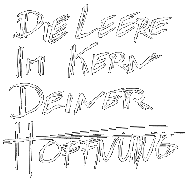Interactive installation: “Surveillance takes place!”
On November 2, 2019 the 20th Museum Night took place in Cologne. We took part with the interactive installation “Überwachung findet statt” (Surveillance takes place) at KunstWerk, in order to set an example with our visitors against video surveillance without any reason.
So what happened there?
We built some dummy video cameras which we placed in front of a green screen. The visitors could then position themselves there and choose a background, e.g. the Ebertplatz, or the Dagger Complex, or the White House, or, or, or. To accompany this, the first lines of our piece “Surveillance” sounded. Afterwards we uploaded the video at TikTok, under our account @DLIKDH. In the course of the night we made so many videos and hopefully set a sign against the surveillance mania. Fun fact on the side: Since TikTok is a Chinese video portal that explicitly sees itself as apolitical, we are very curious how long the videos will stay on TikTok at all. Because: surveillance is taking place.
For some reason, we’re not on TikTok right now under @DLIKDH. But you can find the videos under the hashtag #dlikdh.
We have also uploaded a compilation of the TikTok videos to Youtube.
Why this action?
It has become a beloved ritual of politicians: An act of violence happens and it has to be shown very quickly that something is being done. The easiest and cheapest way to do this is to demand video surveillance. However, the question arises as to the effectiveness of video surveillance. See the collection of material from digitalcourage.de.
We are firmly convinced that the surveillance of public spaces (such as now soon at Ebertplatz in Cologne) restricts our freedom rights more than it contributes to our security. For us, this form of random mass surveillance is nothing more than security theatre, in the sense that the American security expert Bruce Schneier once aptly put it.
Random surveillance of Ebertplatz is also problematic because the square is a popular venue for rallies and demonstrations. Soon all demonstrators on the square can be automatically filmed. If a facial recognition program were to be added, with a link to the corresponding databases, this would be the end of freedom of assembly.
A view into the near future
What would happen if Turkey, in the framework of a possible data exchange agreement, would get access to such a database with the identified participants in pro-Kurdish demonstrations on Ebertplatz?
Or another scenario: What if the AfD were to become the strongest party in the Bundestag and provide the chancellor? Do we want to make it as easy as possible for such a party to enter the total surveillance state? We do not yet feel anything of the dystopia that we create for ourselves on a daily basis. But what has become of “stop the beginnings”?
We are holding it there with Benjamin Franklin:
“Whoever gives up freedom to gain security will lose both in the end.”
But we also hold it with Bruce Schneier, who explains to us that there is something beyond security theater that actually works: Good old-fashioned police work, with well-trained, competent and sufficient police officers, who ideally act transparently and not hidden from parliamentary control. Unfortunately, however, this is more complex, more expensive and much more difficult to get across than a few video cameras.



